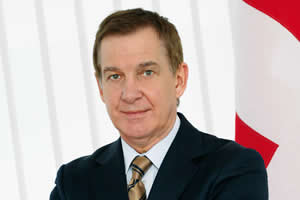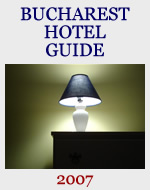Swiss face decision time
Well-behaved Romanians at the European Football Championship have helped boost Romania’s image abroad in Switzerland, ahead of a Swiss vote on opening its labour market
 |
|
|||||||||||||
Switzerland is expected to organise a referendum in 2009 to decide weather to open its labour market to Romanians and Bulgarians.
This process happened not only with the last ten EU members who joined in 2004, but also with the founding members of the Union. Now around 20 per cent of the country’s population are of non-Swiss nationality.
“Romania is known in west Europe as a country of culture and I hope migration will not change this image,” Swiss Ambassador to Romania, Livio Hurzeler, tells The Diplomat. “Writers, sculptors and musicians, such as Constantin Brancusi, Mircea Eliade, Dinu Lipatti and Mihai Eminescu lived abroad in countries such as France and Switzerland.”
Switzerland has until 2017 to open the labour market completely to the Romanians and Bulgarians under its EU obligations. There is not a natural migration of Romanians to Switzerland. Part of this is because 65 per cent of the Swiss speak German and this language does not come as naturally to Romanians as Italian or Spanish, nor it is as widespread among the young as English - although German’s popularity in increasing. But last June they had a good reason to travel to the country.
“Romanian supporters who came to Switzerland to watch the football in this year’s European Championship showed a very civilized behaviour and did not create problems nor violence,” says Hurzeler.
Such positive propaganda has a larger impact on the Swiss than the recent news on ethnic disagreements between some Romanians and Italians south of the border, according to Hurzeler.
The Romanian economy is booming, but political instability and a lack of coherence in the decision-making process are inhibiting the rate of this development. This also includes an open conflict between the President and Prime Minister. “Romania needs to have a strong will, strong Government and a strong majority to face these challenges,” the Swiss diplomat says.
This month the European Commission will release its verdict on justice reform in Romania. “We have some fears regarding corruption a nd we are waiting for the report with great interest,” says Hurzeler. “We think the measures taken by the Government to tackle corruption are not sufficient and that they do not have enough power to handle the situation.”
Most of the large Swiss companies, such as Holcim, Nestle and ABB are already established in Romania, while only medium-sized companies are left to arrive in Romania. In banking, one of the biggest investment funds on the Bucharest Stock Exchange is the Swiss-based Julius Baer, while private bankers, such as Clariden Leu, are active in the local market. “Private banking is a low profile but increasing activity in Romania,” the Ambassador says.
By Ana Maria Nitoi
Nestle: bars and cereals remain top sellers
Fitness breakfast cereals and fruit and chocolate bars are maintaining their positions as the best-selling products of Swiss food and beverage producer Nestle. “We have problems with getting enough chocolate bars,” says Paul Nuber, general manager at Nestle Romania.
But in Romania in 2009, the pet care segment, including Friskies and Purina, is likely to become the highest performer in the company’s portfolio. However the dietary products market is still underdeveloped compared to western countries, due to the high prices of these products.
“Last year the summer was not very hot in Romania and ice cream sales did not perform so well,” Nuber argues. “France and Spain also experienced low temperatures and lots of rain. But when we sell less ice cream, we sell more chocolate.”
The company is also planning to expand its production facility in Timisoara, which currently has a production capacity of 12,000 tonnes per year.
Nestle
Food and beverage producer
■ 2007 turnover:
530 million Euro
■ 2008 forecast turnover:
700 million Euro
Holcim: dynamic growth
in cement market
to continue momentum
Real estate and construction have registered a massive growth in the last few years with a beneficial effect on construction materials, with the cement market growing by an annual rate of 15 to 20 per cent.
Holcim Romania’s general manager Markus Wirth believes 2008 will retain this momentum. “Romania’s size is significant and Holcim will continue to invest to better sustain the growth rate of the market,” adds Wirth.
The company intends to further develop the ready-mixed concrete and aggregates business. “We are looking at all options from building ready-mixed concrete and aggregates plants to acquiring already existing ones,” say Wirth.
Holcim’s overall investments in Romania between 1997 and 2007 exceeds 513 million Euro. This year the Romanian subsidiary will invest more than two million Euro in environmental protection projects, a similar amount to 2007.
Holcim Romania
Cement producer
■ 2007 turnover:
269.76 million Euro
■ 2008 forecasted turnover:
324.2 million Euro
■ 2008 investments: 135 million Euro
■ Employees: 1,400
Syngenta: 2008 set to be bumper year for agriculture
Due to droughts in 2007, Syngenta scored some losses in Romania, but expects to recover after this season’s crop is harvested.
Owing to last year’s bitter harvest, Syngenta has also delayed starting its seed production for three years. “Our seeds bank was dramatically reduced and it needs three years to be rebuilt,” says CEO of Syngenta Romania, Paul Claxton.
However with an increased interest from foreign investors and the beginning of EU payments to farmers, this year Romania’s full potential as a regional agricultural powerhouse is beginning to see shoots of recovery.
“Romania sits in a unique position having two million hectares which wait to be brought back to production and this situation cannot be found anywhere else in Europe,” says Paul Claxton. Romania is farming 7.4 million hectares, while a total of 9.4 million are available.
“Romanian farmers, unlike other European farmers, don’t have enough money and immediately after their crop is available, they sell it before it is harvested because they need to pay off their debts and to have some money to invest in the upcoming season,” says Claxton.
EU funds from the Common Agricultural Policy should now allow farmers to buy new machinery and make investments. “If one has a 10,000 hectare farm and can get a check for more than a half a million Euro from EU subsidies, they could start buying tractors and combines and the return on profit is greater in the years to come,” adds the CEO.
Syngenta Romania
Manufacturer of seeds and fertilisers
■ Market share: around 20
per cent
■ 2007 turnover: 23.8 million
Euro
■ 2007 loss: 0.3 million Euro
■ 2008 forecasted turnover:
32.3 million Euro
■ 2008 profit: 0.1 million Euro
■ Employees: 57 (in process
of recruiting more)
Roche: looking for partnerships with local research teams
Drug manufacturer Roche is showing interest in research and development in Romania and is now in discussions with some local research laboratories for partnership opportunities.
“The universities have the highest potential to grow in this area,” says general manager of Roche Romania, Dan Zamonea.
However Roche cannot estimate when these ambitions will be realised. Since 1990, Romanian research has not enjoyed any special attention or governmental funding. European and local research-related funds are available and Romania should learn how to utilise such cash to stimulate innovation on a local level, including in the healthcare field, says Zamonea.
Meanwhile greenfield investments in production facilities in Romania are not a priority for Roche.
Although public healthcare in Romania constantly faces criticism for inefficiency and inconsistency of care, Zamonea has seen an improvement. “The strategy of the Ministry of Public Health has become clearer in the last years and public decisions such as the [nationwide survey of Romanians’ state of health] National Healthcare Evaluation Programme or the funds allocated to help general practitioners buy computers are a big step towards modernisation,” Zamonea says.
Roche Romania
Cement producer
Pharma producer
■ Rank in Romania: second
■ 2007 turnover: 99 million Euro
■ 2007 market share:
6.8 per cent
■ 2007 best sold products:
medicines against hepatitis B and C and anaemia
Helvetansa: set to open new luxury store on Calea Victoriei
Luxury retailer Helvetansa is planning to launch a new high-class watch and jewellery store in Romania on Calea Victoriei in a one million Euro investment which is set to open by the end of 2008.
“One area of the shop will be exclusively dedicated to haute horologerie,” says Adrian Stoican, managing director of Helvetansa.
The Swiss retailer now represents 33 brands on the market and this year will add to its portfolio jewellery and watch manufacturer Van Cleef & Arpels, which will have a joint venture with Helvetansa for a monobrand boutique.
Louis Vuitton has opened a store in the shopping arcade connected to the JW Marriott hotel, stepping up the competition in the luxury market. Regarding whether high class watch brands will open their own shops in Romania, Stoican belives this is a natural trend for the big players. “The opening of the Louis Vuitton shop will further attract luxury brands to Romania,” says Stoican.
The managing director believes that the possibility of Helvetansa facing a takeover by a larger player in the field is a possibility. “We haven’t thought about selling just yet as we are still focusing on building our brand,” he says. The most successful brand is the Vacheron Constantin, a watch that has seen a significant annual increase. Helvetansa is also looking to extend its network in other cities.
Helvetansa
Luxury watches and jewellery importer
■ Turnover 2007: 5.9 million Euro
■ Employees: 25
■ Stores: Bucharest (2), Pitesti (1)
Chronotime: luxury
watch showroom set for Blvd Unirii
Swiss-Romanian firm Chronotime International, which distributes luxury watches in Romania, will open later this year a 100 sqm showroom and product servicing centre on Blvd Unirii in Bucharest.
The new facility will be designed in partnership with watch manufacturer Omega, says Ion Schiau, CEO Chronotime International.
Meanwhile the company’s Blvd Balcescu flagship, where its most exclusive products are sold in a Cellini store, will see an extension this year.
“Our business has witnessed an accelerated increase and we need to offer a special retail exposure that meets the demand of the market,” says Schiau.
At the moment the company represents over 20 brands of watches in Romania sold through the Cellini network and other local retailers nationwide.
“Our best-selling brands in terms of volume are Swatch and Tissot, but the demand for more expensive brands such as Hublot is high in Romania,” says Schiau. “People are now more sophisticated, they know the trends and are very open to experience new brands.”
The Romanian market is now dominated by Romanian retailers and importers and the country will not see any big watch producers coming directly to this country to open their own shops, argues the CEO. “They would need at least five more years to come to Romania,” he adds. “They are producers and not retailers and their aim is to have their brands well represented in a country.”
Chronotime International
Luxury watches and jewellery importer
■ Turnover 2007: over 5.2 million Euro
■ Employees: 26
Franke: global crisis not upsetting growth targets
The international financial crisis may have affected the kitchen system sector at an international level, but this is not valid for the Romanian market, according to Valeriu Cobaschi, general manager at Franke Romania.
The company employs directly 42 people and for 2007 posted a turnover of 15 million Euro. For 2008 the company anticipates this will rise to 17 million Euro.
The company’s local subsidiary Franke Kitchen Systems is now the local market leader in the built-in sector of kitchen appliances with a share of about 30 per cent.
The Romanian sector of built-in appliances accounts for ten per cent of the entire kitchen systems market.
“We have launched a new range of products containing stainless steel sanitary equipment which is useful in big public institutions and airports, because these have anti-vandalism qualities,” says Cobaschi.
“We already have some contracts with important companies such as Porsche,” he adds.
At the moment Franke has 30 franchised showrooms all over the country and there are plans to open another this year in west Bucharest.
Franke Romania
■ 2007 turnover: 15 million Euro
■ 2008 forecasted turnover: 17 million Euro
■ Market share: 30 per cent
Employees: 42
Charles Voegele: five stores planned by end of year
Swiss clothing retailer Charles Voegele is planning to enter Romania with five stores to open in the second half of 2008. “The reason for choosing Romania as a test market is the general economic development of the country,” says Renzo Radice, head of corporate communication & investors relations. The group is looking at shopping centres, large malls and high street locations. The retailer targets men, women and families aged between 30 and 65.
Charles Voegele
Clothes retailer
■ Development plans: five stores in the second half on 2008
■ Target: malls and high streets
By Corina Ilie, Ana Maria Nitoi
and Alexandra Pehlivan

















